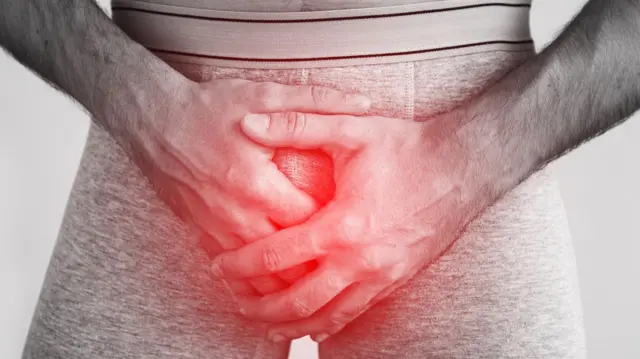- 0120-4438-111
- info@searchmymedical.com
- Office No 519, B Tower, Ithum Tower, Noida Sec 62.
Penile Cancer
Home > Penile Cancer

What is Penile Cancer?
Penile Cancer is a rare type of cancer that occurs on the skin or inside the tissues of the penis. Early detection and treatment are crucial for improving outcomes and preserving quality of life.
Several risk factors are associated with Penile Cancer, including poor hygiene, a history of human papillomavirus (HPV) infection, smoking, and phimosis (a condition where the foreskin cannot be fully retracted). HPV is a particularly important risk factor, as certain strains of the virus are known to cause changes in skin cells that can lead to cancer. Circumcision, especially when performed at birth, has been shown to significantly reduce the risk of penile cancer, likely because it prevents infections and conditions like phimosis that increase cancer risk. Chronic inflammation and irritation of the penis, as seen in conditions like lichen sclerosus, may also increase the likelihood of developing this cancer.
Symptoms of Penile Cancer
- Persistent sores or growths on the penis.
- Redness, swelling, or discharge under the foreskin.
- Thickening or changes in penile skin texture.
- Lumps or swollen lymph nodes in the groin.
Treatment Options for Penile Cancer
The choice of treatment depends on the stage and spread of cancer.
-
Surgery
- Circumcision: Removal of cancerous tissue limited to the foreskin.
- Partial or Total Penectomy: Removal of part or all of the penis in advanced cases.
- Lymph Node Dissection: Removes cancer-affected lymph nodes to prevent further spread.
-
Radiation Therapy
- Uses high-energy rays to destroy cancer cells, often used alongside surgery.
-
Chemotherapy
- Involves anti-cancer drugs administered orally, intravenously, or topically.
-
Immunotherapy
- Enhances the immune system’s ability to target and destroy cancer cells.
Stages of Penile Cancer
- Stage 0 (Carcinoma in Situ): Cancer is confined to the top layer of skin.
- Stage 1: Cancer has spread to connective tissue but not lymph nodes.
- Stage 2: Cancer affects deeper tissues and may involve lymph nodes.
- Stage 3 & 4: Advanced stages where cancer spreads to lymph nodes and distant organs.
Preventive Measures and Risk Factors
-
Risk Factors
- Human Papillomavirus (HPV) infection.
- Poor genital hygiene.
- Smoking or tobacco use.
- Phimosis (inability to retract the foreskin).
-
Prevention Tips
- Practice good hygiene.
- Get vaccinated against HPV.
- Avoid tobacco products.
- Regular health check-ups for early detection.
Recovery and Post-Treatment Care
- Regular follow-up visits to monitor recovery and detect recurrence.
- Psychosocial support and counseling to address emotional challenges.
- Lifestyle adjustments, including a healthy diet and quitting smoking.
Needs of lifestyle changes
- Healthy Diet: Eat balanced meals with fruits and vegetables.
- Regular Exercise: Stay active to boost recovery.
- Avoid Tobacco and Alcohol: Helps reduce recurrence risk.
- Monitor Sexual Health: Stay aware of any changes.
- Follow-up Care: Attend all check-ups.
How Search My Medical Will Help You
- Access to Accredited Facilities: We connect you with top-tier hospitals
and clinics globally, ensuring high standards of care and patient safety. - Surgeon Selection: Our network includes highly qualified surgeons with
expertise in your specific procedure, ensuring you receive care from the
best professionals. - Appointment Coordination: We handle all logistics related to
scheduling consultations, pre-operative assessments, and surgical
dates, saving you time and effort. - Travel and Accommodation Arrangements: If your procedure is
overseas, we assist with travel logistics, including flight bookings, hotel
accommodations, and local transportation. - Pre-Operative Support: We guide you through necessary preparations,
including medical evaluations and dietary guidelines, to ensure you are
ready for surgery. - Post-Operative Care: After your procedure, we provide resources and
support for recovery, including follow-up appointments and monitoring
your healing process. - 24/7 Assistance: Our dedicated support team is available around the
clock to address any questions or emergencies that may arise during your medical journey.
Latest Post
-
Opps, No posts were found.
Want to consult about health? Contact Us
We ensure a seamless experience. Our network also provides detailed post-surgery support.
Get in Touch
Get in touch with us for any questions or inquiries. We’re here to help and provide the information you need. Reach out via phone, email, or through our website contact form.


Emergency Contact
- Free Call 24/7
- +91 0120-4438-111


Location
- Open In 24 Hours
- SMM, B Tower, Ithum Tower, Noida Sector 62.


Phone Contact
- Within Working Hours
- +91 8810549762
